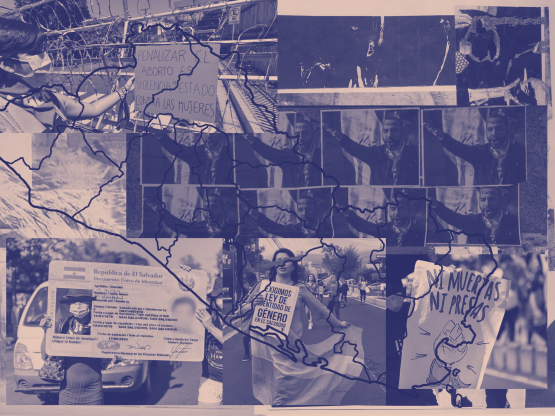
Daniela Escobar is a Salvadoran junior journalism major who is minoring in globalization studies and international relations.
Warning: Some links might contain graphic images
Violence against the LGBTQIA+ community and a lack of sexual and reproductive rights have persisted in El Salvador. While the Salvadoran government has assured its people that the country is safe, its legislation needs a drastic change.
Daniela Escobar is a junior journalism major with a minor in globalization studies and international relations.
If you’ve heard that the 72nd Miss Universe competition will be held in El Salvador, you’ve probably heard that it’s because the small Central American country — as President Nayib Bukele, 41, has stated — has become “the safest country in Latin America,” and that young people “are no longer victims” of violence.
Under the Bukele administration, neither MS13 nor Barrio 18 are in the streets of El Salvador the way they were for decades. This is because after 10 months, the regime has captured around 60,000 alleged gang members.
Tourists now can go and enjoy surfing on El Salvador’s beautiful beaches, walk safely through the streets and enjoy the company of Salvadorans without fear. But it seems that either tourists or Bukele’s supporters are ignoring voiceless Salvadorans. In El Salvador, attacks on reproductive and sexual rights, as well as sexual diversity, have affected Salvadoran women and LGBTQIA+ community for decades.
Sexual and reproductive rights of women and girls
El Salvador classifies abortion as a crime with no exceptions — not even for potentially-fatal cases or rape survivors. Many women, including those who have suffered miscarriages or obstetric emergencies, have been sentenced to 13 or more years in prison under abortion charges in a country where rape is punishable by six to 10 years.
At the outset of 2022, at least 181 women were prosecuted for illegal abortions. In June 2022, a court sentenced a woman who had an obstetric emergency to 50 years for “aggravated homicide.” Interestingly, between September 2021 and September 2022, the courts released six women who were in prison for six to 13 years.
Approximately 25 out of every 1,000 women in El Salvador between the ages of 15 and 44 have had unsafe abortions. Domestic violence and lack of sexual health education are two critical factors that strongly correlate with unsafe abortion rates in the country.
Bukele has publicly rejected abortion rights. In a 2020 interview with singer René Pérez, Bukele said “of course you have to punish the rapist, but why punish the innocent?”, referring to embryos.
LGBTQIA+ Rights:
Members of the LGBTQIA+ community remain a target of homophobic and transphobic violence in their daily lives.
Levels of education are an obstacle when it comes to obtaining steady jobs in El Salvador. However, the LGBTQIA+ population faces a tougher scenario. In a survey conducted in 2022 by the organizations Comcavis Trans and Ormusa, out of the 86 people interviewed who identified as part of the LGBTQIA+ community, 45% of the participants stated that they were unemployed, 21% had a casual job, 20% had a formal job, 8% owned their own business and 6% were employed in sex work.
In another outcome of the survey, 90% of the participants reported discrimination due to their sexual orientation or gender identity.
At the beginning of 2022, the Salvadoran Supreme Court ordered the Legislative Assembly to pass a new law that would allow transgender people to change their legal name based on their gender identity. It is now 2023, and the legislators still haven’t discussed the law.
Without any law protecting the LGBTQIA+ community, discrimination will continue. According to a Human Rights Watch document released in 2022, trans people face significant discrimination because their gender and identification documents do not match. They have been discriminated against in the areas of health care, employment and voting rights (because they are “not the person on their identification card”).
Bukele has an 80% approval rating among Salvadoran people. Despite all of this, the popular president erases the Salvadoran LGBTQIA+ community. I find it ridiculous.
The president has the liberty to see us the way he wishes and for us to see him the way we want to see him. But those who are part of the LGBTQIA+ community cannot keep silent and cannot remain unseen by the government; if we stay silent, then we could be accomplices to the genocides that could arise.
We Salvadorans can no longer tolerate anti-abortion legislation. Women and young girls cannot be criminalized for having an obstetric emergency or abortion, or simply for having the right to choose what they want to do with their bodies and their lives. Neither police nor government officials should be able to prevent someone from having an abortion.
The Salvadoran government needs to collaborate with the ministry of education to form programs on sexual and reproductive health education. The government should train teachers on how to educate students on these issues which should not be taboo. Students should be taught to speak up against sexual violence and advocate openly for their fundamental rights.
A country that the president calls “safe” is not really safe at all. El Salvador, and its people, have already been in the dark and have been far from the freedom of equality for many decades now; it is time to come out of that cave of darkness.
The next step for Bukele’s administration must involve anti-discriminatory legislation and a guarantee of sexual and reproductive rights. If this administration is not going to work for our rights, then Bukele needs to work on this in his next administration if he is reelected in 2024.
Correction 3/5/2023: A previous version of this article misused the Spanish word Pulgarcito.












